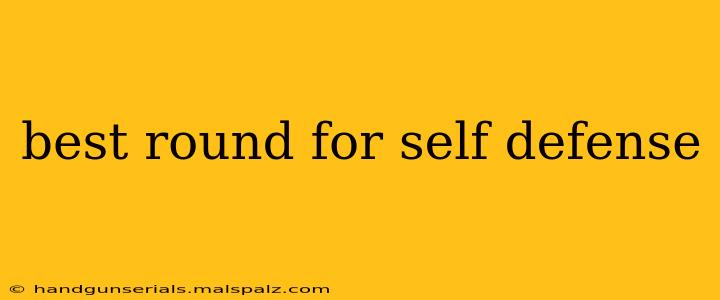Choosing the right ammunition for self-defense is a critical decision, impacting your safety and the potential legal ramifications following an incident. This isn't about choosing the most powerful round; it's about selecting the round best suited for your specific needs and circumstances, considering factors like your firearm, your physical capabilities, and the legal environment in your area.
This guide explores various calibers and their suitability for self-defense, aiming to provide a comprehensive understanding to help you make an informed decision. Remember, consulting with a firearms expert and understanding your local laws is crucial before making any purchases.
Factors to Consider When Choosing Self-Defense Ammunition
Before diving into specific rounds, let's examine the key factors that influence the optimal choice:
1. Your Firearm:
The caliber your firearm uses significantly limits your options. A .38 Special revolver offers a different set of choices than a 9mm Glock. Understanding your firearm's capabilities, including its reliability with various ammunition types, is essential.
2. Shot Placement vs. Power:
While stopping power is important, accurate shot placement is paramount. A smaller caliber round accurately placed in a vital area will be far more effective than a larger caliber round that misses its target entirely. Practice is key to improving your accuracy.
3. Recoil Management:
Excessive recoil can hinder your ability to make follow-up shots, especially under stress. Consider your physical strength and experience when choosing a caliber. A round with manageable recoil allows for faster, more accurate shots.
4. Penetration and Expansion:
Self-defense ammunition should penetrate sufficiently to reach vital organs but not overpenetrate and endanger bystanders. Expanding bullets (hollow points, for example) are designed to increase stopping power by creating a larger wound cavity, but their effectiveness varies based on factors such as velocity and the material they impact. Full metal jacket (FMJ) rounds are typically reserved for target practice due to their higher penetration and lack of expansion.
5. Legal Considerations:
Laws regarding ammunition vary by location. Some jurisdictions restrict the use of certain types of ammunition, such as hollow-point rounds. Check your local and state laws before making a purchase.
Popular Self-Defense Calibers and Ammunition Types:
While there's no single "best" round, several calibers consistently prove effective in self-defense situations:
9mm Parabellum:
- Pros: High capacity magazines, relatively low recoil, widely available, good balance of penetration and expansion with appropriate ammunition selection.
- Cons: Can overpenetrate with certain rounds.
.45 ACP:
- Pros: High stopping power, large wound cavity with expanding ammunition.
- Cons: More significant recoil, lower capacity magazines.
.38 Special +P:
- Pros: Relatively low recoil, manageable for smaller framed individuals, widely available.
- Cons: Lower capacity than larger calibers.
10mm Auto:
- Pros: High stopping power, flat trajectory.
- Cons: Significant recoil, requires substantial practice.
.223/5.56 NATO (for carbines/rifles):
- Pros: High velocity, large magazine capacities.
- Cons: Overpenetration potential is a significant concern in self-defense scenarios within close proximity.
Ammunition Types: Hollow-point (JHP) rounds are generally preferred for self-defense due to their increased expansion and reduced overpenetration potential compared to full metal jacket (FMJ) rounds. However, their performance can vary depending on factors like velocity and the material impacted.
Conclusion:
The best round for self-defense is highly dependent on individual factors. Prioritize shot placement, practice regularly, and choose a caliber and ammunition type you can handle effectively and safely. Consult with experienced shooters and professionals to determine the best option for your specific needs and ensure you fully understand and comply with all applicable laws and regulations. This guide offers a starting point for your research, but professional guidance is invaluable in making this crucial decision. Remember, responsible gun ownership involves continuous learning and practice.

